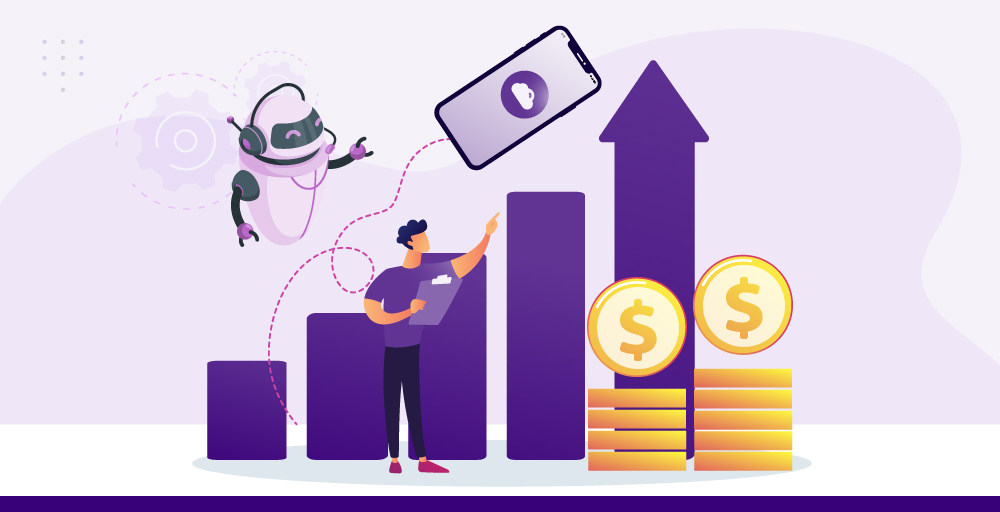
Are you constantly seeking innovative strategies that enhance your customer interactions, leading to business growth? Cloud-based communications solutions have become game-changer tools, offering many benefits that revolutionize how businesses connect with their customers.
Due to its versatility, cost-effectiveness, accessibility, and mobility, cloud-based communication has gained popularity over traditional phone lines.
In this article, we delve into how these technologies enable businesses to achieve new levels of customer engagement, drive customer and sales conversion, and increase customer loyalty. Let’s look at the key factors that are driving businesses to adopt cloud-based phone systems and integrate artificial intelligence.
Evolution of Sales and Marketing

In this ever-evolving digital technology landscape, there are many significant changes leading to customer expectations and the availability of data and information via the Internet or other sources. Here are some pinpoints for the evolution of traditional sales and marketing to data-driven and personalization:
- Traditional marketing mainly focuses on producing large-scale goods and services and selling them to customers with mass communications like television commercials, radio broadcasts, and print ads to reach a widespread audience.
- Without knowing customers’ needs or interests, the sales representative would mostly cold call their customers to promote their product or services.
- Since data technologies have revolutionized, it has changed how businesses interact with their customers using many platforms like social media.
- Data-driven and personalized marketing strategies help businesses collect and analyze customer data like online behavior, demographics, and purchase history.
- It helps to know the customer preferences, identify their potential target market segmentations, and customize marketing messages accordingly.
So, it is not enough to make the product only; providing value to the customer is also important. Also, those who can utilize the data and deliver personalized, digitally optimized experiences will likely increase in the future of sales and marketing. A business that is often connected with customers expects to provide personalized services and relevant experience. To adapt to this cutthroat competitive market, you must embrace digital channels such as social media and digital marketing tools. You can also choose the best phone system for your marketing and advertising teams to engage with customers and reach a target audience.
Hence, data is a valuable asset for businesses that use them to gain insights into customer behavior, improve marketing campaigns, and make informed decisions.
What is a Cloud Phone System?
A cloud phone system is a virtual phone system that utilizes the internet to deliver phone services; it’s hosted and managed by a third-party provider. The cloud phone system is not just about making calls but also provides sales and marketing teams with the tools they need to connect, collaborate, and achieve their goals.

Cloud phone systems, also known as Voice over Internet Protocol (VoIP) or cloud Private Branch Exchange (PBX), have become increasingly popular in recent days due to their communications solutions.
Since it is a cloud-based solution, it saves the cost of expensive hardware and software installation. It offers many advanced features, such as call recording, call forwarding, etc, that enhance your business. It also provides accessibility and mobility to manage communication effectively. You can also select the best phone system for your sales teams for better engagement with your customers.
Benefits of Cloud Phone Systems for Sales and Marketing Teams
Increased mobility:
Due to ever-evolving digital technology, it is very accessible even for the remote team or worker without facing any communication barriers; with access to the phone system and collaboration, you can promptly respond to customer inquiries. It helps to balance work and personal life more effectively, enhancing overall well-being and productivity.Reduced costs:
Since the cloud phone system is subscription-based, it avoids hardware setup costs and reduces maintenance fees. It also benefits from scalability, which allows you to add or remove users according to need, avoiding over-provisioning. Due to interaction with existing business applications, you can reduce the need for additional software.Enhanced collaboration:
Due to advanced features like real-time call monitoring, call recording, video conferencing, and integration with CRM, the Cloud phone system helps to make smooth communications among sales and marketing teams, which breaks down the barriers and streamlines the workflows.Scalability:
With a cloud phone system, you can easily scale up and down according to the needs of a growing business. As sales and marketing teams expand, you can quickly add phone lines and features without needing large infrastructure investments.Easy setup and maintenance:
Maintaining cloud phone systems generally requires limited cost and is easy to set up since the provider handles most of the technical aspects. It helps IT staff to focus on critical tasks, such as cybersecurity and network management.
AI Integration

Using AI, businesses can transform their customer interactions and sales processes and grow at high rates. With the integration of AI with CRM systems lets your businesses personalize customer interactions, creating a more engaging and satisfying experience. AI also helps forecast sales and do trend analysis. Here are some AI integration benefits for sales and marketing:
Benefits of AI Integration for Sales and Marketing
Personalize customer interactions
AI algorithms analyze customer data to better understand individual preferences and needs. Based on this information, the business creates personalized marketing campaigns and product recommendations that enhance the customer experience. Personalized services not only bring customer satisfaction but also build brand loyalty and strong customer connections.Automate repetitive tasks
In sales and marketing, there might be automated work like data entry, lead qualifications, follow-up emails, etc. So, AI automates repetitive and time-consuming tasks so that sales and marketing professionals will be free and focus on more strategic and value-added activities.Improve efficiency
AI integration helps to reduce errors, enhance workflows, and improve decision-making processes, leading to enhanced efficiency and productivity. Due to AI algorithms, you can get deeper insights into customer data. This allows sales and marketing to make an informed decision promptly and stay ahead of this cutthroat competition.Enhanced customer services
Through AI-powered chatbots and virtual assistants, it provides 24/7 customer support by answering FAQs and resolving complex issues. This also can reduce the workload of the employees and improve the overall performance.
Hence, you can also get a USA virtual phone number as well as your own country’s number to increase scalability and enhance your brand image.
Future Trends: The Road Ahead for Cloud Phone Systems and AI Integration
As technologies continue to evolve, there are several emerging trends that are likely to shape the future of customer engagement and business success. Some of them are explained below:
Use of voice recognition
The use of voice recognition and natural language processing (NLP) abilities are becoming increasingly powerful, enabling cloud phone systems to record conversations, analyze sentiments, and extract key information. This will lead to more natural interaction with customers, allowing your teams to understand customer needs and demands.Chatbots
The chatbots help to enhance customer interactions by answering their more complex inquiries and context-aware conversations. With the advancement of natural language processing and machine learning, chatbots are more likely to become conversational and able to understand context, providing emotional support as well.
The AI chatbots help to enhance customer services, streamline the communications process, and contribute more personalized and efficient user experience.Predictive analytics
AI-powered predictive analytics tools enable your businesses to analyze the customer data, call recording, and purchase history of your customers. It helps identify sales opportunities, forecast sales, prioritize leads, develop sales strategies, and close more deals for sales and marketing teams.
Conclusion
In conclusion, the future of sales and marketing is bounded by the advancement of cloud phone systems and AI integrations. These technologies offer a changing approach to customer engagement, enabling businesses to personalize interactions, eliminate repetitive tasks, and gain data-driven insights.
Hence, as these technologies evolve, emerging trends such as enhanced voice recognition, advanced chatbots, and predictive analytics will revolutionize how businesses connect with their customers, leading to more sustainable growth and success in a competitive market.
FAQs
What is the key differentiator in Salesforce AI Cloud?
There are some key differentiator in Salesforce AI Cloud they are mentioned below:- Trusted AI
- Open AI
- Business-Ready AI
How does Marketing Cloud integrate with Sales Cloud?
The integration between the marketing cloud and sales cloud through a salesforce-developed connector called marketing cloud connect. This connector enables smooth data sharing and synching between the two platforms, which allows marketers and sales teams to work effectively and efficiently.What are the benefits of integrating Salesforce Marketing Cloud?
Integration with the salesforce marketing cloud with your existing marketing tools can benefit your business in many ways, such as unified customer view, enhanced customer engagement, increased ROI and revenue growth, scalability, automated marketing workflow, etc.Will AI replace Salesforce?
AI will not entirely replace Salesforce, but it will likely make it more powerful due to chatbots, predictive analytics, and sales automation, which help automate repetitive tasks, provide deeper insights into customer data and analytics, predict future events, and optimize the business process.